I WANT TO THANK the normal ones I interviewed for their generosity, courage, and insight; I hope I did justice to their experience. Don Meyer, founder of Sibnet, and the siblings who participate in this invaluable Internet network welcomed me. My research assistant Marcey Needel was of immense help and relentless in her pursuit of every possible document on this elusive subject. I am indebted to my editor, Philip Rappaport, and my agent, Jennifer Rudolph Walsh, for believing in my work and for giving me the opportunity to write this book. Special gratitude goes to my dear friends Sue Grand, Leonard Schoolman, and Harriet Wald for their encouragement; to Paul Russo for assistance both technical and emotional; and to my husband Richard Brookhiser for sustaining me. The Normal One is dedicated to my beloved friend and colleague Judith Kaufman, whose observation years ago I never forgot: Someday you will have to write about your brother.
I traveled around a great deal I would have stopped, but I was pursued by something. It always came upon me unawares Then all at once my sister touched my shoulder. I turn around and look into her eyes. Oh Laura, Laura, I tried to leave you behind me, but I am more faithful than I intended to be!
introduction
N OBODY KNOWS I HAVE A BROTHER. My best friends never hear his name. He has always been a source of embarrassment and discomfort for me, but Ive never wondered very much about his impact on my life. Being his sister feels vaguely unreal and irrelevant; my destiny has nothing to do with his.
This is astonishing, because I am a psychotherapist who has spent years trying to understand my own and my patients childhoods. Somehow Ive managed to erase my own closest relative.
I am not alone. Beyond slogans (all men are brothers, sisterhood is powerful) and the occasional soft-focus picture book, shockingly little attention is paid to siblings in general, much less to troubled, difficult, or disabled ones. And although millions of people have such relatives85 percent of Americans have siblings, so few extended families are exemptpractically nothing has been written about them. Worse, little has been thought about them; newspaper headlines (the Kaczynski brothers, wayward presidential siblings), literature (Dostoyevskys The Brothers Karamazov, the plays of Williams and ONeill), the Bible (Cain and Abel, Joseph and his brothers), and the dreams of their higher-functioning brothers and sisters tell their story, not psychological research. Their influence is intensified because it is so hidden, even in a culture where people willingly expose the most intimate details of their lives.
The purpose of this book is to reveal the neglected, lonely, and lifelong trauma of growing up with an abnormal brother or sister and its effects on personality and society; the reality of the lives of the normal ones is far more complex than the sentimental image presented by the media and even by their own families. It examines the world all such siblings share, whether the disability is mental or physical, minor or catastrophic, ignored or overemphasized. It analyzes how and why their influence is repudiated, and offers remedies.
Normal ones suffer from a psychological condition I name the Caliban Syndrome after the brutal, repugnant slave of the magician Prospero in Shakespeares The Tempest, the not-quite-human creature who tried to rape Prosperos flawless daughter Miranda. Caliban is the thing of darkness Prospero must accept at the plays end. Because a damaged sibling is always a disavowed part of self, I believe every intact sibling must come to terms with the Caliban within in order to become fully human. Understanding the influence that such a sibling inevitably has on ones destiny is an essentialand frequently avoidedtask.
Whatever their relationship in the external world, damaged siblings loom large in the internal world of their normal brothers and sisters, as manifested in the four symptoms of the Caliban Syndrome that this book examines:
- Premature maturity
- Survivor guilt
- Compulsion to achieve
- Fear of contagion
The Caliban Syndrome has an impact far beyond the immediate families of the disabled and the difficult. These relationships are an exaggeration of the dynamics of every sibling relationship, which like every other human bond always has its dark side. Disconnecting internally from unacceptable aspects of a sibling is as universal as the primordial emotions these relationships evoke, and we pay a price for amputating them. Without acknowledging hate and repudiation, we can never truly love ourselves or anyone else; superficial assertions that short-circuit the full intensity of these prohibited emotions never work. Neither does professing spiritual uplift or sugarcoating the lifelong rigors and frustrations of having your closest relative never be your peer. Acknowledged or not, growing up with a difficult or damaged sibling is one of the defining experiences of a persons life.
The disabled and their parents have much-needed advocates; until now their siblings have had practically none. In their behalf, I take issue with the current politically correct euphemism special needs children because I believe that all children have special needs. Compassion for the extraordinary trials their families endure and admiration for their achievements should not blind us to the damage done by ignoring the toll on their normal siblings. I use the terms normal abnormal intact, and damaged not to make value judgments but to reflect more accurately the point of view of higher-functioning siblings, who typically live in an environment that requires them to suppress taboo emotions, judgments, and the evidence of their senses. Idealizing their lives as somehow ennobling, and concomitantly denigrating and denying that there is indeed such a thing as normality (with all its contradictions and complications), damages everybody and leads to dangerous self-estrangement in society as a whole.
No one with an abnormal sibling has a normal childhood. Consciously or unconsciously, every intact sibling is haunted by the fear of catching the disability, a fear that always has a modicum of psychological truth. Family gatherings and significant events become occasions for anxiety and suppressed shame. Cheerful caretakers, mature before their time, they are supposed to consider themselves lucky to be normal. They feel tormented by the compulsion to compensate for their parents disappointments by having no problems and making no demands, and they are often unaware of the massive external and internal pressure to pretend that nothing is amiss. Their success is always tainted by their siblings failure, their future clouded by an untoward sense of obligation and responsibility. Their goal is to be as different from their sibling as possible. They live forever in the shadow of the one who does not function.

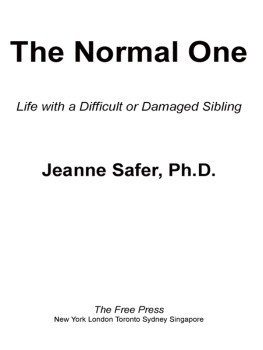


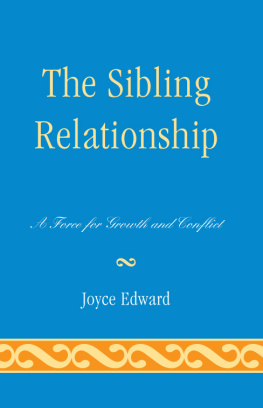
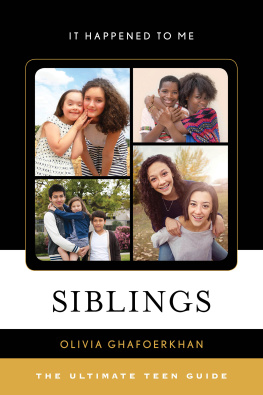
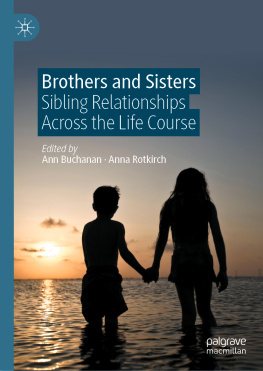
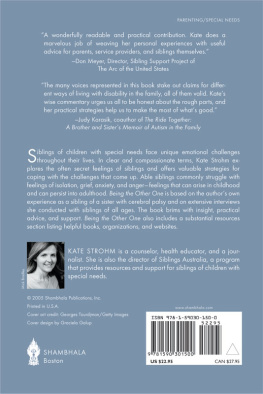
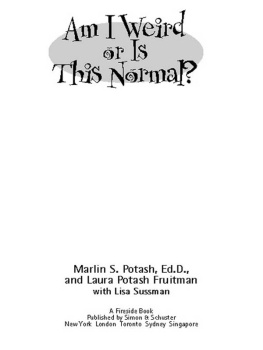



 4dc21
4dc21